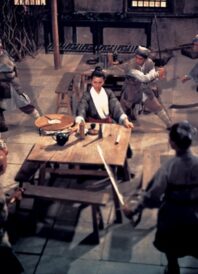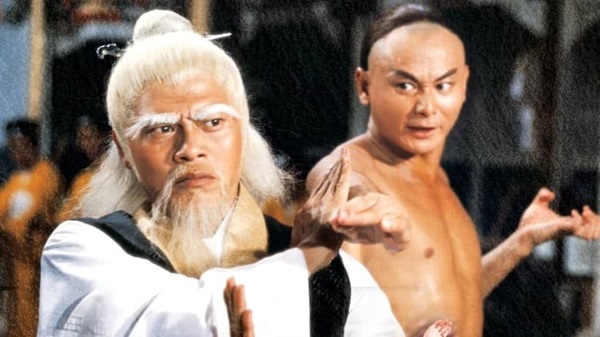
On Dec 22nd, global streaming service MUBI launched a 14-film collection of Shaw Brothers films entitled Shaw Brothers: Wuxia Warriors and Kung Fu Masters onto its platform. Teaming up with Celestial Pictures and its vast Shaw Brothers library, MUBI’s retrospective series on the Shaw Brothers contains films from the studio’s most prolific timespan, from 1966’s Come Drink with Me to 1983’s Eight-Diagram Pole Fighter. The series also highlights some of the Shaw Brothers’ most celebrated directors with multiple inclusions from Chang Cheh and Lau Kar-lueng.
The oldest film in the series is the genre defining classic Come Drink with Me. King Hu, one of the most celebrated filmmakers in Chinese history, directed Come Drink with Me. It was an unbridled success both critically and financially and many still credit it for starting the explosion of Wuxia film’s popularity worldwide. Wuxia, which translates to ‘martial heroes’, is a form of storytelling that has gone on for centuries and in multiple forms across Chinese folklore and has existed in some form, be it written, on stage via Peking Opera performances, or spoken word. But it was the films that King Hu directed under the Shaw Brothers banner that are credited with launching the “second wave” of Wuxia and for taking the films across the globe. If you are of a certain age you may remember Saturday afternoons at home in front of the TV where you usually could find a Shaw Brothers or a Godzilla film playing.
Come Drink with Me is a masterpiece of the genre and its inclusion here makes it a must-watch. It catapulted the career of the legendary Cheng Pei-pei, with her being dubbed “cinema’s first female action hero” and ignited the tired genre of the Wuxia film which had been relegated to sleepy television serials about wandering artists, kind of like the US series Kung Fu that brought David Carradine to fame in the ’70s. King Hu’s direction and attention to detail spoke, and still do, to audiences of all ages. His flair for directing action made the film thrilling and engaging. Despite the lack of knowledge that the then 19-year-old Pei-pei had about martial arts, her extensive ballet training made her the perfect fit for the film, heavily inspired by traditional Peking Operas. To this day, Come Drink with Me is still lauded as a masterpiece.
King Hu is an acclaimed filmmaker who went on to a legendary career. But the filmmakers perhaps most responsible for Wuxia’s arrival in North America are still Chang Cheh and Lau Kar-leung, making their inclusion here with multiple films inevitable. Chang Cheh started his career tied directly to rising star Jimmy Wang Yu as he directed the star in multiple films, arguably the most notable of them being The One-Armed Swordsman, which is included here. But in 1978 Cheh directed a film that would become a cult classic and spawn a series of films starring its leads. Dubbed the ‘Venom Mob’ by Western audiences, the cast of The Five Venoms (aka The Five Deadly Venoms) would find worldwide notoriety. Sheng Chiang, Chien Sun, Philip Chung-Fung Kwok, Lo Meng, Pai Wei, and Feng Lu would all go on to lengthy careers in and out of the Shaw Brothers cannon.
In part due to the iconic and easily translatable imagery of each character being associated with one of the five poisonous creatures of Chinese folklore, The Five Venoms became a crossover hit and a staple of television sets across America. Be it the chemistry of the 6 men of the mob, or the iconic performance from a bombastic Lo Meng, The Five Venoms connected with audiences in a way that other films up to that time hadn’t, especially audiences outside of China. The film also spun off a series of unrelated films all starring the mob together again, of those the most notable may be Crippled Avengers and Five Element Ninjas, both of which are also in this series.
Lau Kar-leung may have been the more direct successor to King Hu as his films included some of the more spiritual feel of Hu’s work in his own. Much like Cheh, Lau started his career mainly linked to a particular actor, in Lau’s case it’s his “godbrother” Gordon Liu. Lau is also seen by some as the godfather of the ‘Shaolin’ in cinema as he brought the Shaolin Temple and its teaching to the forefront, perhaps most notably with 1978’s The 36th Chamber of Shaolin. Starring Liu as a fictionalised version of the legendary martial artist San Te, the film catapulted both its star and director to instant fame and has become regarded as another classic of the genre. Lau and Liu would go on to work together for decades, their partnership producing films like Dirty Ho, Eight-Diagram Pole Fighter, Heroes of the East, Legendary Weapons of China (all of which show up in this series ) as well as many trips back to the Shaolin Temple.
MUBI’s series also includes another film widely considered a cult classic and a standout of the genre with Jeong Chang-hwa’s King Boxer, perhaps more widely known by its more exploitation-friendly North American title, Five Fingers of Death. Star Lo Lieh, who himself would go on to direct Gordon Liu in another film in the series, Clan of the White Lotus, delivers an iconic performance, and the film’s soundtrack and visual flair would go on to influence decades of filmmakers including Quentin Tarantino. Last, but certainly not least, the series includes another of Chang Cheh’s earlier classics The Boxer from Shantung, and Chor Yuen’s incendiary cult classic, that’s nowhere near as salacious as the title implies, Intimate Confessions of a Chinese Courtesan.
For more information on all of these titles and what else MUBI has to offer, as well as pricing and a free trial, check out mubi.com
- Genre: Kung Fu, Martial Arts, Wuxia
- Release Date: 12/22/2023
- Directed by: Chang Cheh, Chor Yuen, Jeong Chang-hwa, King Hu, Lau Kar-leung, Lo Lieh
- Starring: Cheng Pei-pei, Chien Sun, Feng Lu, Gordon Liu Chia-hui, Jimmy Wang Yu, Lo Lieh, Lo Meng, Pai Wei, Phillip Chung-Fung Kwok, Sheng Chiang
- Produced by: Shaw Brothers
- Studio: Celestial Pictures, Shaw Brothers


